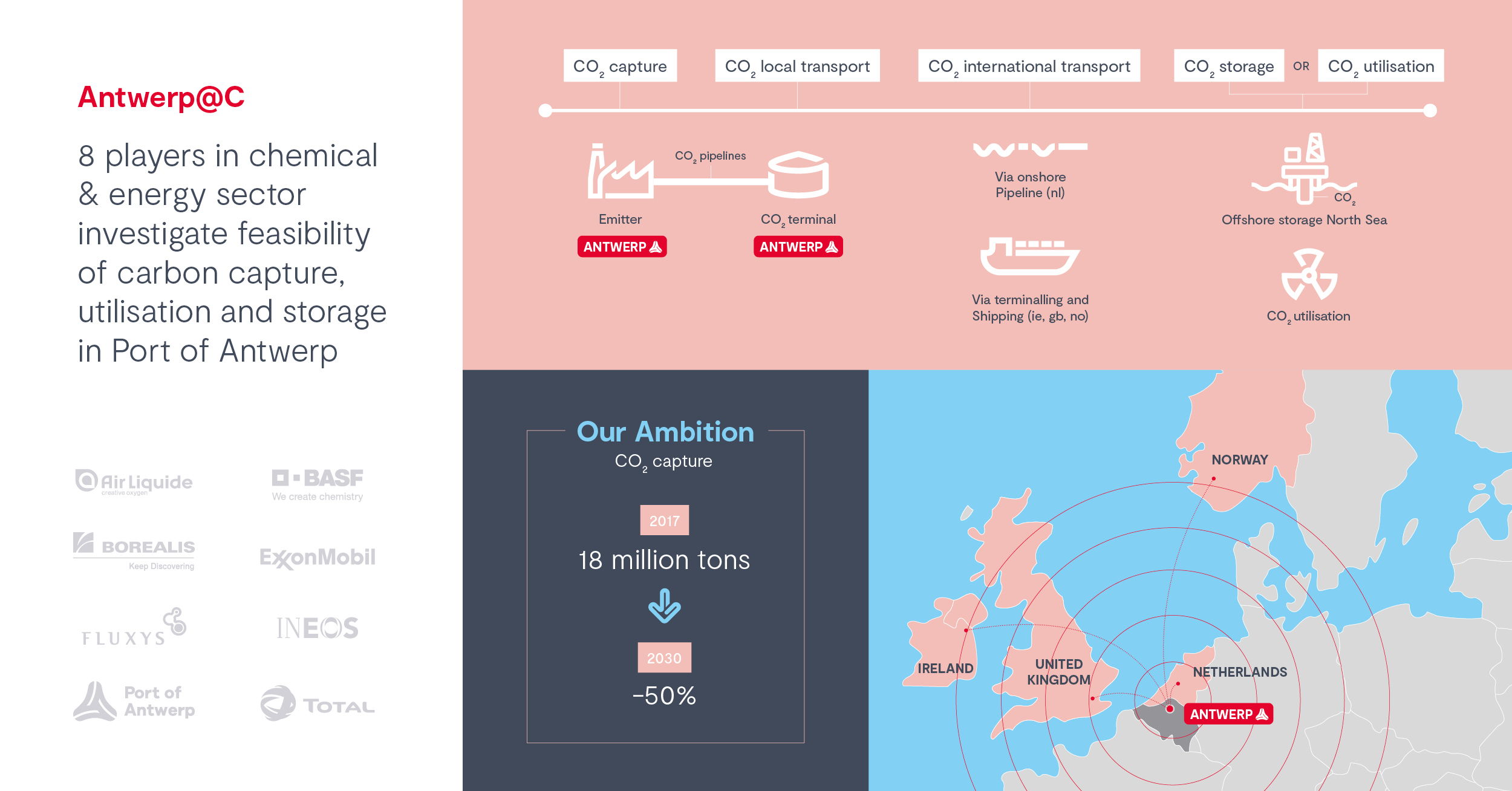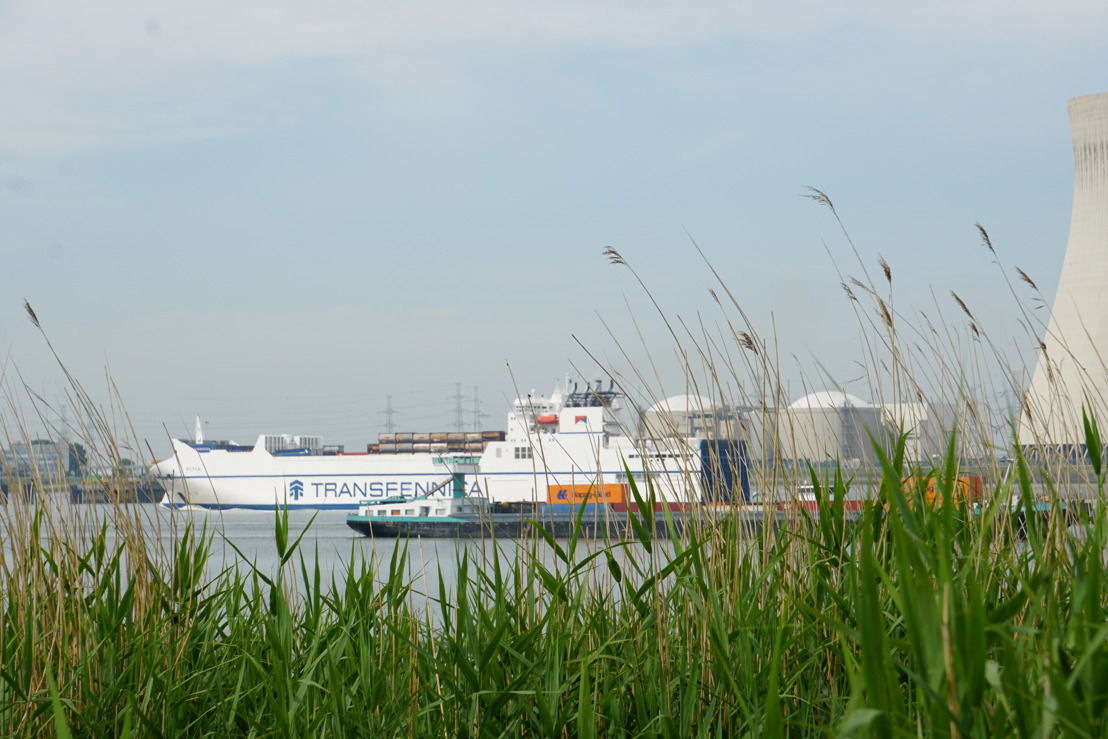Antwerp@C investigates potential for halving CO2 emissions in Port of Antwerp by 2030
Applications for EU subsidies are next step in innovative CO2 reduction
Port of Antwerp brought seven leading chemical and energy companies together at the end of 2019 to reduce CO2 emissions and take practical steps in the transition to a sustainable, low-carbon port. The consortium consists of Air Liquide, BASF, Borealis, ExxonMobil, INEOS, Fluxys, Port of Antwerp and Total. With the project entitled Antwerp@C the partners aim to keep CO2 out of the atmosphere and so to make a significant contribution towards the climate objectives, thanks to applications for capturing and utilising or storing CO2, all within a relatively short time span and at reasonable costs. The project has the potential to reduce the CO22 emissions within the port (18.65 million tonnes greenhouse gas emissions in 2017) by half between now and 2030. This week Fluxys, Port of Antwerp, Total and Air Liquide submitted EU subsidy applications for taking the project one step further.
Port of Antwerp, the carbon capture pioneer
Port of Antwerp is home to the largest integrated energy and chemicals cluster in Europe. This makes it the ideal location to set up new, cross-border collaboration projects for innovative CO2 reduction. To this end, Air Liquide, BASF, Borealis, ExxonMobil, INEOS, Fluxys, Port of Antwerp and Total joined forces at the end of 2019 under the name of Antwerp@C, to investigate the technical and economic feasibility of building CO2 infrastructure to support future CCUS (Carbon Capture Utilisation & Storage) applications. Carbon Capture & Storage (CCS) and eventually also Carbon Capture & Utilisation (CCU) – i.e. reusing CO2 as a raw material for the chemical industry – are seen as important routes in the transition to a carbon-neutral port.

Feasibility study
Antwerp@C is currently carrying out a feasibility study with the support of the Flemish Agency for Innovation & Enterprise (Vlaams Agentschap Innoveren & Ondernemen, or VLAIO). This will investigate the possibility of building a central "backbone" in the form of a pipeline along the industrial zones on both the Right and Left banks of the Scheldt, along with various shared processing units, a shared CO2 liquefaction unit, interim storage facilities and cross-border transport of CO2, both by ship and by pipeline.
Cross-border transport infrastructure
Since Belgium does not have suitable geological strata, international collaboration will be necessary to transport the CO2 across borders and store it permanently in e.g. depleted offshore gas fields. For this purpose Antwerp@C is investigating the possibilities of transport to Rotterdam by pipeline or by ship to Norway.
Subsidies are essential
Broad support – especially financial support – by the EU, the Belgian Federal Government and the Flemish Government will be essential to ensure the success of the project. Antwerp@C is pursuing two initiatives for cross-border CO2 transport infrastructure, namely the CO2TransPorts project for a pipeline to Rotterdam and the Northern Lights project for transport to Norway by ship. Since CCS is seen by the EU as an important lever to combat climate change these initiatives have been granted recognition as Projects of Common Interest (PCI). Subsidy applications for detailed studies were submitted this week for both projects under the terms of the Connecting Europe Facility (CEF). A decision for grant award is expected in November. In addition subsidy applications are being prepared for the European Innovation Fund as part of the Green Deal.
Port of Antwerp CEO Jacques Vandermeiren declared: "This promising project will enable us to play our pioneering role even more effectively. It demonstrates once more that collaboration is key for generating a cluster effect and creating innovative, operational added value. If this shared infrastructure can actually be realised then it will benefit the entire industrial community in the port and make a valuable contribution towards the Flemish, Belgian and European climate goals."
Wouter De Geest, chairman of the Antwerp@C consortium: "As the largest petrochemical cluster in Europe we are assuming our responsibility with unprecedented collaboration between eight leading companies. Together we are investigating the possibilities for cutting CO2 emissions from our production processes, as well as additional innovative solutions for more sustainable petrochemistry in Antwerp."
Port alderman Annick De Ridder: "This project demonstrates our capabilities for technological progress are closely tied to the future of our climate. If we as the second-largest port in Europe can contribute towards saving up to half of our CO2 emissions, this will open up countless opportunities for sustainable growth in our industry and our prosperity. By taking on this pioneering role we aim to be an inspiration for the entire port community."
For more information about this press release:
Frederik Pieters, +32 486 090881, frederik.pieters@basf.com

20200528 - Fact sheet - Antwerp@C - UK.pdf
PDF 694 KB
